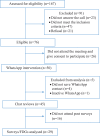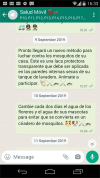WhatsApp-based intervention in urban Colombia to support the prevention of arboviral diseases: a feasibility study
- PMID: 38794811
- PMCID: PMC11238608
- DOI: 10.1080/20477724.2024.2358263
WhatsApp-based intervention in urban Colombia to support the prevention of arboviral diseases: a feasibility study
Abstract
Arboviral diseases remain a significant health concern worldwide, with over half the world's population at risk for dengue alone. Without a vaccine or targeted treatment, the most effective strategy of prevention is vector management with community involvement. mHealth interventions, like WhatsApp, offer promising results for engaging communities and promoting healthier behaviors. This study explores the feasibility of integrating WhatsApp in vector control activities to improve arbovirus prevention in Colombia. A mixed-methods approach was employed to assess the WhatsApp-based intervention. WhatsApp messages were sent to 45 community women for 5 weeks to increase their knowledge and practices about dengue, Zika, and chikungunya. Pre-and-post surveys and focus group discussions were conducted in community settings to measure the feasibility and acceptability of this intervention. Chat reviews were done to assess the usability of users. A total of 1566 messages were exchanged in 45 WhatsApp chats. High acceptance and good usability (82% of users used the app for replying) were reported in this study. WhatsApp messages were perceived as short, clear, and enjoyable. Users liked the frequency, and design of messages. Pre- and post-surveys demonstrated improvements in the knowledge and practices of arboviral diseases. The intention to apply this knowledge in practice was reflected in a significant improvement, particularly in cleaning the laundry tank once a week (pre 62.1% to post 89.6%, p < 0.008). This study suggests that using WhatsApp as an additional tool could be a feasible, acceptable, and affordable strategy for improving the adoption of better practices in the prevention of arboviral diseases.
Keywords: WhatsApp; Zika; chikungunya; dengue; mHealth; mobile phone; prevention.
Conflict of interest statement
No potential conflict of interest was reported by the author(s).
Figures
References
Publication types
MeSH terms
LinkOut - more resources
Full Text Sources
Other Literature Sources


